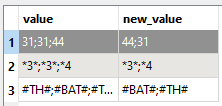I have string attributes which contain repetitions of the type ";;;". How to get rid of these, however numerous the ";" are. I also want to nullify the attribute if it ends up being ";" but that can be done with a trimmer afterwards.
I also would like to delete other repetitions.
Examples
"31;31;44" should become "31;44"
"*3*;*3*;*4*" or "*3*;*4*;*3*" should become "*3*;*4*"
"#TH#;#BAT#;#TH#;#BAT#" should become "#TH#;#BAT#"












